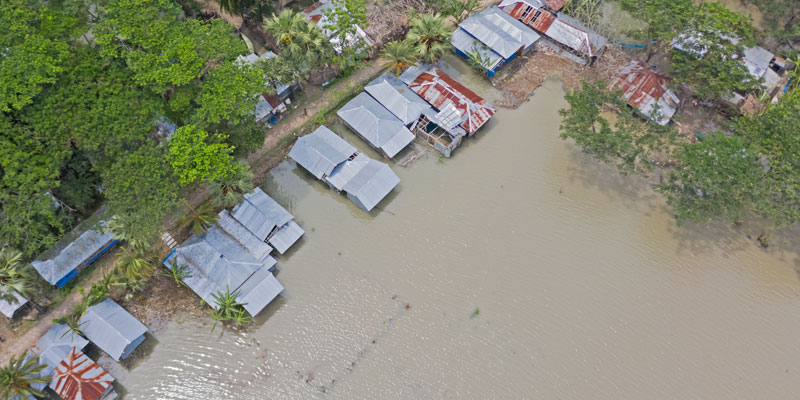Blog: The human cost of climate change and Covid-19 in the Bay of Bengal
Posted on Sunday 24 October 2021

The dominant narrative on climate change in the UK is around storms and floods, changing patterns of rainfall, and increasing heat and drought. Here, cities such as York are beginning to experience the effects of climate change in their own communities. Across the UK, annual heat-related deaths are expected to triple by 2050. This increase from 2,000 to 7,000 deaths represents 12 people per 100,000 of the population, or about 1.5 per cent of all deaths. Yet, in common with many other developed countries, the UK is relatively sheltered from the worst impacts of climate change.
The Bay of Bengal
Over the last year, we have been working in a research network exploring the environmental links to population health and wellbeing in coastal areas of the Bay of Bengal. This bay, the largest in the world, is home to 1.4 billion people across a number of South Asian nations, about a quarter of the world's population. These people are some of the world’s poorest and most vulnerable. A large proportion work in traditional occupations and many lack basic services such as electricity, drinking water, sanitation, education and housing.
Here, climate change is melting the Himalayan glaciers and inducing sea level rise, culminating in increased flooding and saline soils unfit for agriculture. Climate change is also leading to increases in the frequency and intensity of tropical cyclones, destroying property and livelihoods, and claiming lives. Here, deaths due to climate change may reach 60 per 100,000 by the end of the century, and account for 10 per cent of all deaths.
The Bay of Bengal is especially susceptible to tropical cyclones. Since Cyclone Aila in 2009, around 100,000 men and women from the Indian Sundarbans delta have been forced to find work in the unregulated sector in cities, far from their homes. In May 2020, just two months after the Covid-induced lockdown in India led to nationwide workplace closures and the exodus of 40 million migrant workers (many returning to the Sundarbans), Cyclone Amphan devastated the delta, causing damage estimated at USD 13 billion. Within a year, before the people could recover, another cyclone, Yaas, struck the Bay of Bengal coast.
The human cost of climate change
Through interviews with some of those affected and with the community organisations which work to provide support and healthcare in the region, our research is helping to raise awareness of the painful experiences of the inhabitants. Our findings have also highlighted how climate change is inextricably linked with many other socio-economic and environmental challenges, and often compounds them, or is exacerbated by them.
Many families in the Bay of Bengal have lost their homes and livelihoods to the cyclones, and the absence of alternate income post-lockdown has driven many into debt. Healthcare and food drain their meagre wages and savings. The cumulative impacts of climate change-related events and Covid-19, together with a lack of support services and uncertainty about the future, have triggered an alarming rise in poor mental health.
Rates of alcoholism have increased among men. Women already struggling to rebuild their homes have been exposed to increased domestic violence, contributing to rises in depression and self-harm. Urgent action to strengthen family and community resources with increased investment in health and social care is needed, along with a long-term commitment to investing in effective and equitable climate change adaptation and alternative livelihood opportunities.
Locally-led, joined-up adaptation
The world urgently needs a far-reaching agreement to reduce carbon emissions, at COP26. But we need to think beyond just carbon. Climate change has multiple impacts across society but it is the poor and the vulnerable who suffer disproportionately from its effects. We struggle to comprehend the sheer number of people that are already affected, and this number is only to rise. The pandemic has demonstrated how people in the UK have gradually de-sensitised themselves to its horrors, even as the number of cases rose to the tens of thousands. Desensitisation makes action less likely. As researchers, we have a critical role to play in highlighting the individual stories at the root of climate change and not allowing them to be lost in the numbers.
Our research in the Bay of Bengal is highlighting how the Covid-19 pandemic has interacted with climate and environmental change, with catastrophic effects for the people who live there. By uncovering the human stories at the heart of the climate crisis, we hope that our work can contribute to not only raising awareness in other countries, but also raising the profile of the problem within the region itself.
The slow but inexorable effects of climate change, compared with more immediate threats such as income loss or unemployment, mean that climate change remains imperceptible to many of the most vulnerable people, despite the impacts they experience. Many local languages lack the vocabulary to adequately articulate climate change risks and remedies, vulnerability and social justice.
Thus, local governments in the region must first be sensitised to recognise the significance of the issue and take effective action. Behind the statistics of climate change are multiple stories of individual human hardship and suffering. Global agreements to reduce greenhouse gas emissions must be informed by these stories. They must be accompanied by increasing commitments to work across national and international borders, to safeguard the fundamental rights and access to food, water, health, housing, education and to secure the livelihoods of those most in need.

Piran White
Professor White’s research is focused on the relationships between ecosystems and human and animal health, especially in the context of climate change and other pressures.

Papiya Mazumdar
Dr Mazumdar is interested in research on reducing public health risks for chronic health conditions, primarily targeted at socio-economically vulnerable populations in South Asia and Africa.
With thanks to collaborators from the Bay of Bengal region who also worked on this blog:
Professor Sugata Hazra and Ms Shaberi Das (Jadavpur University), Dr Albert Salamanca (Stockholm Environment Institute Asia), Dr Manzoor Hanifi, Dr Ammatul Fardousi and Dr Sihan Sadat Khan (International Centre for Diarrhoeal Disease Research, Bangladesh), Dr Aniruddha Dey, Ms Piu Sengupta and Ms Sutapa Ghosh (Professional Institute for Development and Socio Environmental Management), and Mr M A Wohab (Southern Health Improvement Samity)
